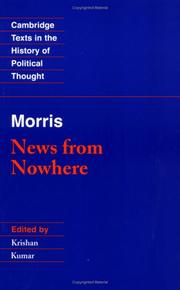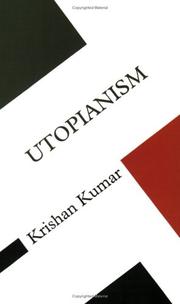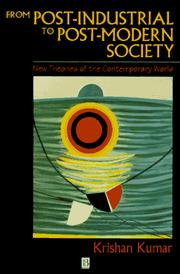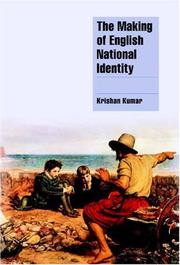| Listing 1 - 10 of 46 | << page >> |
Sort by
|
Book
ISBN: 0631167145 Year: 1991 Publisher: Oxford Cambridge, Mass. Blackwell
Abstract | Keywords | Export | Availability | Bookmark
 Loading...
Loading...Choose an application
- Reference Manager
- EndNote
- RefWorks (Direct export to RefWorks)
Comparative literature --- Thematology --- Anti-utopies --- Antiutopias --- Contre-utopies --- Distopias --- Dystopias --- Dystopies --- Dystopieën --- Utopias --- Utopias in literature --- Utopies --- Utopies dans la littérature --- Utopieën --- Utopieën in de literatuur --- Dystopias in literature. --- Dystopias. --- Utopias in literature. --- Utopias.

ISBN: 0521422337 0521420075 1139170406 Year: 1995 Volume: *9 Publisher: Cambridge, UK New York Cambridge University Press
Abstract | Keywords | Export | Availability | Bookmark
 Loading...
Loading...Choose an application
- Reference Manager
- EndNote
- RefWorks (Direct export to RefWorks)
News from Nowhere (1890) is the most famous work of one of the greatest British writers and thinkers, William Morris. It is a utopian picture of a future communist society, drawing on the work of Ruskin and Marx and written in response to what Morris saw as soulless and mechanical visions of socialism. In this work of his last years, Morris distilled many of his leading ideas on politics, art and society, imagining a world in which capitalism has been abolished by a workers' revolution and nature and society have become beautiful habitations for humanity. In an era that has seen the collapse of state socialism, Morris's damning critique of this conception, and his positing of a powerful alternative, have important contemporary resonances.
Utopias --- Utopies --- Utopieën --- 820 "18" MORRIS, WILLIAM --- #GROL:SEMI-32<08> Camb --- #GROL:SEMI-32-05.5 --- Ideal states --- States, Ideal --- Utopian literature --- Political science --- Socialism --- Voyages, Imaginary --- Dystopias --- Engelse literatuur--19e eeuw. Periode 1800-1899--MORRIS, WILLIAM --- 820 "18" MORRIS, WILLIAM Engelse literatuur--19e eeuw. Periode 1800-1899--MORRIS, WILLIAM --- Social Sciences --- Political Science --- Utopias.
Book
ISBN: 0631148736 9780631148739 Year: 1987 Publisher: Oxford: Blackwell,
Abstract | Keywords | Export | Availability | Bookmark
 Loading...
Loading...Choose an application
- Reference Manager
- EndNote
- RefWorks (Direct export to RefWorks)
Utopias --- Utopias in literature --- Dystopias --- Dystopias in literature --- Utopies --- Utopies dans la littérature --- Dystopies --- Dystopies dans la littérature --- Utopian literature --- Ideal states --- States, Ideal --- Political science --- Socialism --- Voyages, Imaginary --- Utopies dans la littérature --- Dystopies dans la littérature

ISBN: 0335153615 Year: 1991 Publisher: Milton Keynes Open University Press
Abstract | Keywords | Export | Availability | Bookmark
 Loading...
Loading...Choose an application
- Reference Manager
- EndNote
- RefWorks (Direct export to RefWorks)

ISBN: 0631185585 0631185593 Year: 1995 Publisher: Oxford : Blackwell,
Abstract | Keywords | Export | Availability | Bookmark
 Loading...
Loading...Choose an application
- Reference Manager
- EndNote
- RefWorks (Direct export to RefWorks)
Postmodernism --- Postmodernisme --- Social aspects --- Aspect social --- 316.77 --- 316.323.9 --- Communicatiesociologie --- Postmoderne maatschappij. Sociologie van het postmodernisme --- Social aspects. --- 316.323.9 Postmoderne maatschappij. Sociologie van het postmodernisme --- 316.77 Communicatiesociologie

ISBN: 0521777364 9780521777360 9780521771887 9780511550058 0521771889 1139809628 1107128676 0511550057 110731688X 110731786X 110731593X 1107321328 110731495X 1299399169 9781107321328 9781107315938 9781107128675 9781139809627 9781299399167 Year: 2003 Publisher: Cambridge ; New York : Cambridge University Press,
Abstract | Keywords | Export | Availability | Bookmark
 Loading...
Loading...Choose an application
- Reference Manager
- EndNote
- RefWorks (Direct export to RefWorks)
Why is English national identity so enigmatic and so elusive? Why, unlike the Scots, Welsh, Irish and most of continental Europe, do the English find it so difficult to say who they are? The Making of English National Identity, first published in 2003, is a fascinating exploration of Englishness and what it means to be English. Drawing on historical, sociological and literary theory, Krishan Kumar examines the rise of English nationalism and issues of race and ethnicity from earliest times to the present day. He argues that the long history of the English as an imperial people has, as with other imperial people like the Russians and the Austrians, developed a sense of missionary nationalism which in the interests of unity and empire has necessitated the repression of ordinary expressions of nationalism. Professor Kumar's lively and provocative approach challenges readers to reconsider their pre-conceptions about national identity and who the English really are.
National characteristics, English --- Imperialism --- Nationalism --- Consciousness, National --- Identity, National --- National consciousness --- National identity --- International relations --- Patriotism --- Political science --- Autonomy and independence movements --- Internationalism --- Political messianism --- English national characteristics --- History --- England --- Civilization. --- History. --- Social Sciences --- Sociology --- Impérialisme --- Caractère national anglais --- Nationalisme --- Identité collective --- Grande-Bretagne --- Histoire --- Angleterre (GB) --- Civilisation
Book
ISBN: 0140220399 0713911468 9780140220391 Year: 1983 Publisher: Harmondsworth: Penguin books,
Abstract | Keywords | Export | Availability | Bookmark
 Loading...
Loading...Choose an application
- Reference Manager
- EndNote
- RefWorks (Direct export to RefWorks)
Progress --- Social history --- Social prediction --- #SBIB:316.334.2A442 --- 316.324.7 --- 316.324.8 --- 316.324.8 Post-industriele maatschappij --- Post-industriele maatschappij --- 316.324.7 Industriele maatschappij --- Industriele maatschappij --- Social progress --- Civilization --- Regression (Civilization) --- Social stability --- Prediction, Social --- Social forecasting --- Sociological prediction --- Forecasting --- Sociology --- Social indicators --- Arbeidssociologie: theorieën over de (post-)industriële maatschappij --- Statistical methods --- Economic sociology --- Progress. --- Social prediction. --- Social history - 20th century
Book
ISBN: 0691153639 0691192804 1400884918 9781400884919 Year: 2017 Publisher: Princeton University Press
Abstract | Keywords | Export | Availability | Bookmark
 Loading...
Loading...Choose an application
- Reference Manager
- EndNote
- RefWorks (Direct export to RefWorks)
What the rulers of empire can teach us about navigating today's increasingly interconnected worldThe empires of the past were far-flung experiments in multinationalism and multiculturalism, and have much to teach us about navigating our own increasingly globalized and interconnected world. Until now, most recent scholarship on empires has focused on their subject peoples. Visions of Empire looks at their rulers, shedding critical new light on who they were, how they justified their empires, how they viewed themselves, and the styles of rule they adopted toward their subjects.Krishan Kumar provides panoramic and multifaceted portraits of five major European empires-Ottoman, Habsburg, Russian/Soviet, British, and French-showing how each, like ancient Rome, saw itself as the carrier of universal civilization to the rest of the world. Sometimes these aims were couched in religious terms, as with Islam for the Ottomans or Catholicism for the Habsburgs. Later, the imperial missions took more secular forms, as with British political traditions or the world communism of the Soviets.Visions of Empire offers new insights into the interactions between rulers and ruled, revealing how empire was as much a shared enterprise as a clash of oppositional interests. It explores how these empires differed from nation-states, particularly in how the ruling peoples of empires were forced to downplay or suppress their own national or ethnic identities in the interests of the long-term preservation of their rule. This compelling and in-depth book demonstrates how the rulers of empire, in their quest for a universal world order, left behind a legacy of multiculturalism and diversity that is uniquely relevant for us today.
World history. --- World politics. --- Imperialism --- Colonialism --- Empires --- Expansion (United States politics) --- Neocolonialism --- Political science --- Anti-imperialist movements --- Caesarism --- Chauvinism and jingoism --- Militarism --- Global politics --- International politics --- Political history --- World history --- Eastern question --- Geopolitics --- International organization --- International relations --- Universal history --- History
Book
ISBN: 0631160078 Year: 1988 Publisher: Oxford Blackwell
Abstract | Keywords | Export | Availability | Bookmark
 Loading...
Loading...Choose an application
- Reference Manager
- EndNote
- RefWorks (Direct export to RefWorks)
Capitalism --- Industrialization --- Marxian school of sociology --- Mass society. --- Social history --- #SBIB:316.334.2A20 --- #SBIB:324H71 --- 316.334.2 --- 316.42 --- Descriptive sociology --- Social conditions --- History --- Sociology --- Marxian sociology --- Marxist sociology --- Sociology, Marxian --- Sociology, Marxist --- Communism and society --- Schools of sociology --- Frankfurt school of sociology --- Industrial development --- Economic development --- Economic policy --- Deindustrialization --- Market economy --- Economics --- Profit --- Capital --- 316.42 Social change. Sociale ontwikkeling. Sociale veranderingen. Modernisering. Evolutie .Sociale revolutie. Modernisme --- Social change. Sociale ontwikkeling. Sociale veranderingen. Modernisering. Evolutie .Sociale revolutie. Modernisme --- 316.334.2 Economische sociologie. Industriele sociologie --- Economische sociologie. Industriele sociologie --- Ontwikkeling van de industriële structuur: algemeen --- Politieke verandering: modernisatie, democratisering, regional development --- History of Europe --- Mass society
Book
ISBN: 0706961668 Year: 1992 Publisher: New Delhi Har-anand
Abstract | Keywords | Export | Availability | Bookmark
 Loading...
Loading...Choose an application
- Reference Manager
- EndNote
- RefWorks (Direct export to RefWorks)
| Listing 1 - 10 of 46 | << page >> |
Sort by
|

 Search
Search Feedback
Feedback About UniCat
About UniCat  Help
Help News
News